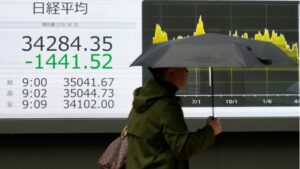After one of the most turbulent stock market starts in history, Asian markets rebounded strongly on Tuesday, buoyed by hopes that Japan would take the lead in trade talks with the United States, Chinese state-owned funds and central bank stabilization.
Japanese indexes rose more than 6% after U.S. President Donald Trump spoke by phone with Japanese Prime Minister Shigeru Ishiba and agreed to start bilateral trade talks. Futures for U.S. and European markets also rose. In China and Hong Kong, stocks rebounded as state-owned funds stepped up purchases and the central bank pledged to provide liquidity to stabilize markets.
Australia rose modestly, with the S&P/ASX 200 up 0.18% at the open.
Japan posted a strong rebound, with the Nikkei 225 up 6.41% and the broader Topix index up 6.81%. The strong rally was attributed to hopes that Japan would secure a favorable position in trade talks with the United States.
In South Korea, the Kospi index rose 1.7%, while the small-cap technology index Kosdaq rose 2.35%.
Hong Kong’s market suffered its biggest one-day drop since 1997 on Monday, with the Hang Seng index plunging more than 13%, according to FactSet data. On Tuesday, however, the Hang Seng Index rebounded by 2.25%, while the Hang Seng Tech Index posted an even stronger gain of 4.17%.
According to analysts, the recovery of the MSCI Asia Pacific Index by 2.6%, after a drop of 8.7% on Monday – the biggest in its history – suggests a temporary “respite” in the markets, with expectations remaining fragile due to ongoing geopolitical tensions.
Despite today’s recovery, the global environment remains extremely fluid. Trump is threatening an additional 50% tariff on China, while continuing to give conflicting messages without clearly revealing what he is asking for in return. As analyst Peter Kim of KB Securities commented, the market “remains taken aback by the intensity and scope of the trade war and its instrumentalization.”
China reacted immediately, describing the US threats as “blackmail” and vowing to respond decisively. At the same time, Chinese institutions continue to buy local securities and support the market with guarantees and yuan depreciation to limit losses.
In contrast, Taiwan recorded a new fall of up to 5.4%, reaching its lowest levels in 14 months, after Monday’s crash, when more than 900 stocks hit their daily loss limit.
Ask me anything
Explore related questions





